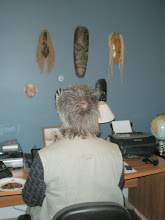Here was a lesson in giving up the myth of control. If you believe you are in control of your life, steering it in a course of your choosing, then old age is an affront, because it is a destination you didn’t choose. But if you think of life instead as an improvisation in response to the stream of events coming at you - that is, a "response to the world as it is" - then old age is more like another chapter in a long-running story. The events are different, but they’re always different, and always some seem too much to bear.
I'm struck by how the fact of aging successfully seems to dovetail so closely to the best suggestions about spiritual growth. Do the best you can. Guide yourself in the right direction, but don't force things. Go with the flow. Don't mourn what you don't have. Don't rage against the machine. In almost every instance I could replace "old age" with "sobriety."
Here are some quotes from our Book . . .
We know that no real alcoholic ever regains control.
He has lost control.
He wished above all things to gain self-control.
As we redouble our efforts at control, and continue to fail, our suffering becomes acute and constant.
All of us felt at times that we were regaining control, but such intervals - usually brief - were inevitably followed by still less control, which led in time to pitiful and incomprehensible demoralization.
We alcoholics are men and women who have lost the ability to control our drinking.
I am NOT in control.
The tendency to sustain mixed feelings, rather than to try to resolve them, is a valuable component of elder wisdom, a recognition that life doesn’t have to be all good to be good, and also that it never will be. Troubles are always with us, and getting rid of this one or that won’t make us happy; it’ll just move another hardship to the head of the class. This is the distinction between “happy in spite of” and “happy if only,” the former being a benefit and the latter a handicap.
I think this is the difference between being being happy and pursuing happiness. I think this is an example of why I should focus on what I've got and not on what I've lost or won't ever get. I need to think: "I'm happy right now."
Remember: Your sole purpose in life may be to serve as an example for others.
"The minute I stopped fighting or arguing I could begin to see and feel."
I think this is the difference between being being happy and pursuing happiness. I think this is an example of why I should focus on what I've got and not on what I've lost or won't ever get. I need to think: "I'm happy right now."
Remember: Your sole purpose in life may be to serve as an example for others.
"The minute I stopped fighting or arguing I could begin to see and feel."
The lesson is to find happiness not in the absence of pain and loss, but in their acceptance. As simple as this lesson sounds, I find it one of the most daunting to live by. Most accomplishments in my life, especially my professional life, have come from rejecting my dissatisfactions - not accepting adversity, but striving against it.
"She kept her spirits up by accepting her pains as a part of life - not barriers to happiness but accompaniments to it. If she was going to have any contentment in her life, it was going to come with arthritis pain and her other losses. Happiness, she said, is when “you have a nice place to live in, and you have enough money to spend and a good family. That’s it. And when you’re young, you fulfill your dreams. I traveled. The world is so wonderful, so different. You should travel around the world and use up your money for sightseeing."
They became more selective about how they spent their time and whom they spent it with. Mingling at cocktail parties or chatting up strangers no longer interested them. They weren’t looking for new friends or networking for new contacts. Another was that they became became less self-concerned, and more aware of being part of a larger whole. Instead of being lonely, they valued having time alone for contemplation.
Receiving is much harder than giving, but this fact is seldom recognized in mainstream American society.

No comments:
Post a Comment